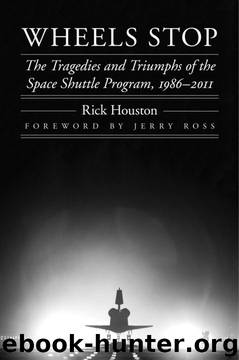Wheels Stop: The Tragedies and Triumphs of the Space Shuttle Program, 1986-2011 (Outward Odyssey: A People's History of Spaceflight) by Rick Houston

Author:Rick Houston [Houston, Rick]
Language: eng
Format: epub
Published: 2013-12-17T13:50:00+00:00
As he began training for his first trip to space, John B.Herrington went straight to the source to get the scoop on what it would take to be a good crew member. What do you want me to do? What are my tasks? How can I be a successful supporting member of the team? And who better to ask than his STS-iii commander, Jim Wetherbee? The mission to be was Wetherbee's fifth as a leftseater, breaking him out of a tie with Hoot Gibson for most commands in the history of human spaceflight.
Wetherbee's response to his eager rookie was simple. Herrington had one priority, and that was to know and understand Wetherbee's weaknesses. "He took that to heart," the veteran crew leader marveled. "He recognized that is what's needed on a team, to cover for each other." Astronauts usually were diligent about sharpening their own skill sets, but helping out a crewmate was going the extra mile. To Wetherbee, it was not about coming across as an arrogant know-it-all busybody. Instead, it was simply a matter of being a good teammate. Going into detail, he explained, "We had very specific ways of thinking that we would talk about. I believe the best crews will not only know the systems and have detailed knowledge of how they operate, what to do, how to respond to emergencies, how to read procedures, and on and on and on. But we would also talk about other things, like communication. How do we communicate with each other effectively? How do we sense when a crewmate needs something?"
Wetherbee implemented a "two-person rule" in which nothing could be done in the cockpit during flight without backup. They always had backup, helping and watching. The rule was explicitly stated and "most of the time followed," Wetherbee said. "It only worked when you are deeply committed to the rule. You have to want to have somebody else help you, and you really, truly have to want to help somebody else." Alone on the flight deck and trying to hold to a critical schedule, or even if it was an easy procedure where the likelihood of making a mistake was minimal, it did not matter. The Wetherbee Two-Person Rule was to be followed, always. STS-113 sophomore pilot Paul S.Lockhart was among those on the flight who took the rule to heart, Wetherbee said:
Paul had such an altruistic way of thinking about things, where the only thing that mattered to him was the mission. His personal glory or satisfaction, or the building up of his credibility, ego, or reputation didn't matter to him. It just flat didn't exist. The only thing he cared about was helping the team be successful. Shortly after we got on orbit, he had a relatively simple procedure to do, but he waited until I was available to watch him andguide him through it. It wasn't because he didn't have confidence. It was because he deeply thought that it was the best thing to do. Even though I had flown many times, I returned the favor to him.
Download
This site does not store any files on its server. We only index and link to content provided by other sites. Please contact the content providers to delete copyright contents if any and email us, we'll remove relevant links or contents immediately.
| Automotive | Engineering |
| Transportation |
Whiskies Galore by Ian Buxton(41998)
Introduction to Aircraft Design (Cambridge Aerospace Series) by John P. Fielding(33122)
Small Unmanned Fixed-wing Aircraft Design by Andrew J. Keane Andras Sobester James P. Scanlan & András Sóbester & James P. Scanlan(32797)
Craft Beer for the Homebrewer by Michael Agnew(18238)
Turbulence by E. J. Noyes(8041)
The Complete Stick Figure Physics Tutorials by Allen Sarah(7366)
The Thirst by Nesbo Jo(6935)
Kaplan MCAT General Chemistry Review by Kaplan(6930)
Bad Blood by John Carreyrou(6615)
Modelling of Convective Heat and Mass Transfer in Rotating Flows by Igor V. Shevchuk(6434)
Learning SQL by Alan Beaulieu(6282)
Weapons of Math Destruction by Cathy O'Neil(6268)
Man-made Catastrophes and Risk Information Concealment by Dmitry Chernov & Didier Sornette(6012)
Digital Minimalism by Cal Newport;(5751)
Life 3.0: Being Human in the Age of Artificial Intelligence by Tegmark Max(5551)
iGen by Jean M. Twenge(5409)
Secrets of Antigravity Propulsion: Tesla, UFOs, and Classified Aerospace Technology by Ph.D. Paul A. Laviolette(5369)
Design of Trajectory Optimization Approach for Space Maneuver Vehicle Skip Entry Problems by Runqi Chai & Al Savvaris & Antonios Tsourdos & Senchun Chai(5066)
Pale Blue Dot by Carl Sagan(4999)
